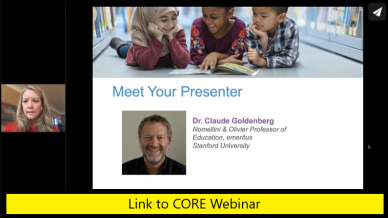CDE will be closed on Monday, September 1, for the Labor Day holiday.
You are here
READing Conference 2022
8th Annual READing Conference - May 2022
The 8th Annual Colorado Department of Education READing Conference is brought to you by
the Preschool through 3rd Grade Office and the Exceptional Student Services Unit.
About the Conference
Welcome to CDE's first prerecorded READing Conference. Below you will find videos by our esteemed speakers. There is a corresponding quiz for each prerecorded session. Please take the corresponding quiz to receive a certificate of participation for each "session."
Please note: The READ Act teacher training requirements CANNOT be met by watching READing Conference videos or taking the related READing Conference quizzes. To learn more about the teacher training requirements, please visit the following CDE website: K-3 Teacher Evidence-Based Reading Training Requirements.
Receive a Certification of Participation
If you would like to receive a certificate of participation for attending the virtual READing Conference, you may take the quiz that corresponds to a prerecorded video.
Keynote Speakers
Sharon Vaughn, Ph.D. (Opening)
Dr. Sharon Vaughn (Professor, The University of Texas) is the Manuel J. Justiz Endowed Chair in Education and the Executive Director of The Meadows Center for Preventing Educational Risk, an organized research unit that she founded with a “make a wish” gift from the Meadows Foundation family.
She is the recipient of numerous awards including the first woman in the history of The University of Texas to receive the Distinguished Faculty and Research Award, the CEC research award, the AERA SIG distinguished researcher award, and the Jeannette E. Fleischner Award for Outstanding Contributions in the Field of LD from CEC. She is the author of more than 35 books and 250 research articles. Several of these research articles have won awards: one the A.J. Harris International Literacy Association award for best article published and another the School Psychology award for best article.
She is currently Principal Investigator on several Institute for Education Sciences, National Institute for Child Health and Human Development, and U.S. Department of Education research grants. She works as a senior adviser to the National Center on Intensive Interventions and has more than six articles that have met the What Works Clearing House Criteria for their intervention reports.
She has conducted technical assistance in literacy to more than 10 countries, 30 State Departments of Education and has worked as a literacy consultant to more than 50 technical assistance projects.
Integrating the Science of Reading Into Instruction
Dr. Sharon Vaughn describes the Science of Reading and its implications for literacy instruction, with a focus on intervention instruction. The presentation covers the five pillars of reading, specific examples of interventions for each concept, and how these concepts work together to improve reading comprehension.
Maryanne Wolf, Ph.D. (Closing)
An Apologia for the Reading Brain: Implications for Dyslexia and All Our Children
Join Dr. Maryanne Wolf, UCLA Director for the Center for Dyslexia, Diverse Learners, and Social Justice, as she bridges the reciprocal relationship between neuroscience and teaching reading. Wolf stresses the role educators play in connecting circuitry regions of the reading brain through explicit and systematic instruction of the foundational reading skills and metacognitive strategies through the lens of what’s best for all learners. Dr. Wolf interweaves the importance of developing deep reading comprehension and language processes to complement word level instruction, sharing her powerful message that knowledge is the source of hope.
Session Speakers
Steven Dykstra, Ph.D.
Dr. Steven Dykstra is a psychologist from Milwaukee, Wisconsin, where he does writing, speaking, and advocacy on the subject of reading and literacy. In his “day job,” he serves children and families with a wide range of mental health and other concerns, for whom challenges to literacy are often overlooked as both cause and consequence of their circumstances. Dr. Dykstra believes knowing and sharing the history of how we got to where we are will help take us to where we need to go by giving us new insights into why we choose and behave as we do. He relies on data, humor, history, anything and everything, but especially metaphor to help us see things in new ways.
A Developmental Model of Trauma, Growth, and Resilience: The Place for Language and Reading
Dr. Steven Dykstra works with traumatized children every day and believes the key to helping children living with trauma is to teach them, notably to teach them to read. Traumatized students struggle at school and poor reading makes those struggles considerably worse. Teaching students living with trauma to read and helping them succeed in school gives them a chance to recover. The research shows that the single most powerful predictor of their ability to overcome the trauma and survive their circumstances is the ability to read. If they can read, they have a chance to find success in school and overcome all those terrible things in their lives. If they can’t, school will only be another source of pain and failure added to all the other sources of pain and failure. If they can read, they can benefit from therapy and everything else we may try to do for them. If they can’t read, all of that is a waste of time.
Claude Goldenberg, Ph.D.
Claude Goldenberg is a professor of education at Stanford University and is an expert in effective reading instruction for English Language Learners and the benefits of bilingual education. He has served on the National Research Council’s Committee for the Prevention of Early Reading Difficulties in Young Children and on the National Literacy Panel, which synthesized research on literacy development among language minority children and youth.
Using the Science of Reading to Improve Literacy Instruction for English Learners
This webinar discusses how the science of reading can be applied to teaching students who are English Language Learners to read and write in English. Access to this video and permission of use is provided by CORE and Dr. Claude Goldenberg.
Click here to take the Claude Goldenberg quiz
Tiffany Hogan, Ph.D., CCC-SLP
Tiffany Hogan is the Director of the Speech and Language (SAiL) Literacy Lab and Professor in the Department of Communication Sciences and Disorders at the MGH Institute in Boston MA. Dr. Hogan studies the genetic, neurological, and behavioral links between oral and written language development, with a focus on co-morbid speech, language and literacy disorders. Dr. Hogan is committed to implementation science and translating research to practice. She serves on national committees of the American Speech-Language-Hearing Association and is an elected board member of the Society for the Scientific Study of Reading.
Developmental Language Disorders: Screening, Diagnosis, Intervention Frameworks, and Literacy Outcomes
In this presentation, Tiffany Hogan, PhD, CCC-SLP, discusses Developmental Language Disorder (DLD), its prevalence, language difficulties presented in children with DLD, myths about DLD, and how to help children with DLD.
Click here to take the Tiffany Hogan quiz
Laura Santerre-Lemmon, Ph.D.
Dr. Santerre-Lemmon is a Clinical Assistant Professor and Director of the Developmental Neuropsychology Clinic in the Department of Psychology at the University of Denver. The clinic provides comprehensive evaluations of learning disabilities, ADHD, and other neurodevelopmental and mental health concerns for children and teens and is part of the Center for Child and Family Psychology, the training center for the department’s APA-accredited doctoral program in clinical child psychology. Dr. Santerre-Lemmon received her PhD in Clinical Child Psychology with a specialization in Developmental Cognitive Neuroscience from the University of Denver and completed her clinical internship with an emphasis in pediatric neuropsychology at Phoenix Children’s Hospital. She completed additional training in neuropsychology and worked on a multidisciplinary team providing evaluations in the Department of Rehabilitation at Children’s Hospital Colorado prior to directing the clinic. Dr. Santerre-Lemmon currently provides supervision to graduate trainees and works with families in the Developmental Neuropsychology Clinic. She is also a current member of the Colorado Department of Education’s Dyslexia Working Group. Her primary interests are in neuropsychology and the comprehensive assessment of dyslexia and co-occurring neurodevelopmental and mental health concerns in youth.
Dyslexia: Assessment Fundamentals and Common Comorbidities
Attendees of this presentation will learn about the assessment process and the characteristics that are important in the evaluation of risk and identification of dyslexia. Commonly co-occurring (i.e., comorbid) conditions, such as developmental language disorder, other learning differences, ADHD, and anxiety, will also be discussed. Attendees will learn about the characteristics of these comorbidities and how best to support children experiencing learning and related challenges.
Click here to take the Laura Santerre-Lemmon quiz
Because of their potential interest or usefulness to the education community or the general public, the Colorado Department of Education (CDE) occasionally provides links from this site to external web sites. It attempts to monitor such links on a regular basis. However, the Department cannot be responsible for the content of any site external to its own.
Further, by linking to other sites, CDE is not endorsing any particular product, practice, service, provider or institution, nor does it necessarily endorse views expressed or facts presented on these sites.
In addition, neither CDE nor any of its employees makes any warranty, express or implied, or assumes any legal liability for the accuracy, completeness, or usefulness of any information linked to from this site.





Connect With Us





